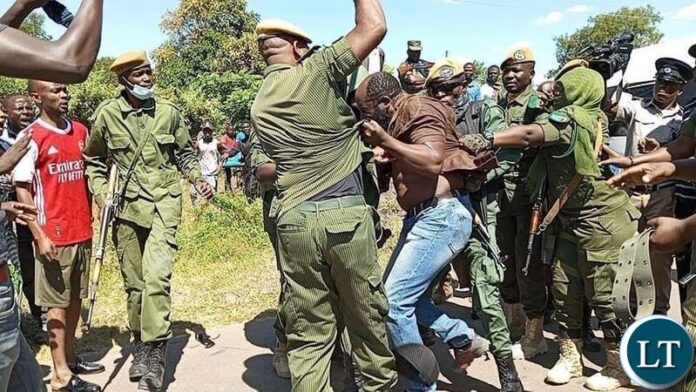By Venus N Msyani
Public Order Act continues to dominate headlines in Zambia today, and not for the right reasons. Once intended to preserve peace and order, the law has become a symbol of suppression, casting a long shadow over President Hakainde Hichilema’s first term.
One opposition official recently revealed that his party has been denied permission to hold rallies 29 times since the United Party for National Development (UPND) came to power. While the number may sound exaggerated, it’s likely accurate.
The existing version of the Act requires organizers to notify authorities in advance of any public gathering, a rule that opposition parties consistently follow. Yet, despite their compliance, rallies and protests remain rare. Police routinely refuse to issue permits. The streets of Zambia have grown quiet, not from contentment, but from constraint.
This silence is dangerous. The denial of permits undermines the freedoms of assembly, association, and expression. Worse still, it threatens press freedom; those who proceed with rallies after being denied permission risk arrest. Journalists are not exempt. If found covering a gathering deemed illegal, they too face detention.
Rodgers Mwiimba of Millennium TV and Innocent Phiri of KBN TV were arrested last year while reporting on an unauthorized opposition rally. Their crime? Filming a confrontation between police and opposition leaders who had planned to defy a permit denial.
On April 13, 2024, the United Kwacha Alliance (UKA) applied for a permit to hold a rally in Kafue, Lusaka Province. The police denied the request, forcing UKA to hold the rally virtually from an undisclosed location and broadcast it live. The move was creative, but it also served as a stark reminder of how far Zambia has strayed from democratic norms.
According to the 2024 World Press Freedom Index by Reporters Without Borders, Zambia ranks 109th out of 180 countries, down from 105th the previous year. This decline reflects growing concerns over media suppression and shrinking civic space.
“Public Order Act has become a blunt instrument for silencing dissent,” said a spokesperson from the Law Association of Zambia (LAZ).
Parliament is reportedly working to amend the Act, but how long will that take? Other legislative changes, like Bill 7, are being rushed through despite widespread public disapproval. Most Zambians oppose Bill 7, which seeks to amend the Constitution, yet efforts are underway to pass it before the upcoming general election.
Not long ago, Bill 7 was deferred. The Speaker of the National Assembly, Hon. Nelly Mutti, SC, FAPRA, MP, has disclosed that she has noted that chiefs in Muchinga Province want it reinstated. That kind of urgency is missing when it comes to reforming the Public Order Act. The process is dragging on, and few seem to care.
Zambia’s democracy cannot afford to wait. The absence of protests over the past four years does not signal public satisfaction with the UPND government; it reflects how the Act continues to suppress the right to assemble, associate, and express dissent.
Moreover, these restrictions are a form of self-sabotage. They send the wrong message to the world, portraying Zambians as incapable of holding peaceful protests and gatherings. This perception not only damages the country’s international reputation but also discourages foreign investment and civic engagement.
Zambia was notably absent from Business Insider Africa’s list of the top 10 most well-governed countries on the continent. It’s not unreasonable to argue that oppressive laws like the Public Order Act, especially when misapplied, contribute to this omission. Once a tool for peacekeeping, the Act has become a mechanism for silencing opposition.
The longer this law remains untouched, the more it erodes public trust in democratic institutions. Reforming the Public Order Act is not just a legal necessity; it’s a moral imperative. It’s a chance for Zambia to reaffirm its commitment to democratic values and restore its standing on the global stage.
If Zambia is to move forward, it must ensure that the right to protest, to assemble, and to speak freely is not just protected on paper but respected in practice. Otherwise, the headlines will keep coming, and they won’t be the kind that build a nation’s pride.



Turncoat. He was very vocal in opposition against the public order act
PF could also restrict but not to the advanced level of UPND. UPND is worse and disappointing to some of us who voted for them, but anyway, not anymore next year
Every thing is out of control is not 5 years enough ?
Instead of complaining day after day it all boils down to one person not being in control. All parties are basically good and have good intentions it’s their leader who leads them astray or let’s them run wild as it is today
If they cant achieve in 5 years there is no second term as we’ve had 60 years of this